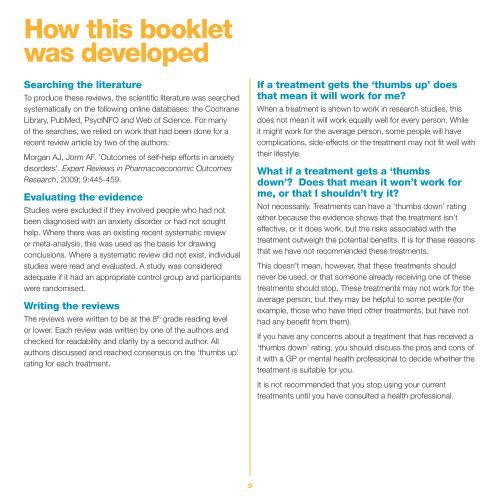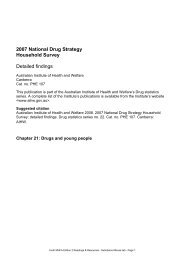A Guide To What Works For Anxiety Disorders - Mental Health First Aid
A Guide To What Works For Anxiety Disorders - Mental Health First Aid
A Guide To What Works For Anxiety Disorders - Mental Health First Aid
You also want an ePaper? Increase the reach of your titles
YUMPU automatically turns print PDFs into web optimized ePapers that Google loves.
How this bookletwas developedSearching the literature<strong>To</strong> produce these reviews, the scientific literature was searchedsystematically on the following online databases: the CochraneLibrary, PubMed, PsycINFO and Web of Science. <strong>For</strong> manyof the searches, we relied on work that had been done for arecent review article by two of the authors:Morgan AJ, Jorm AF. 'Outcomes of self-help efforts in anxietydisorders'. Expert Reviews in Pharmacoeconomic OutcomesResearch, 2009; 9:445-459.Evaluating the evidenceStudies were excluded if they involved people who had notbeen diagnosed with an anxiety disorder or had not soughthelp. Where there was an existing recent systematic reviewor meta-analysis, this was used as the basis for drawingconclusions. Where a systematic review did not exist, individualstudies were read and evaluated. A study was consideredadequate if it had an appropriate control group and participantswere randomised.Writing the reviewsThe reviews were written to be at the 8 th grade reading levelor lower. Each review was written by one of the authors andchecked for readability and clarity by a second author. Allauthors discussed and reached consensus on the ‘thumbs up’rating for each treatment.If a treatment gets the ‘thumbs up’ doesthat mean it will work for me?When a treatment is shown to work in research studies, thisdoes not mean it will work equally well for every person. Whileit might work for the average person, some people will havecomplications, side-effects or the treatment may not fit well withtheir lifestyle.<strong>What</strong> if a treatment gets a ‘thumbsdown’? Does that mean it won’t work forme, or that I shouldn’t try it?Not necessarily. Treatments can have a ‘thumbs down’ ratingeither because the evidence shows that the treatment isn’teffective, or it does work, but the risks associated with thetreatment outweigh the potential benefits. It is for these reasonsthat we have not recommended these treatments.This doesn’t mean, however, that these treatments shouldnever be used, or that someone already receiving one of thesetreatments should stop. These treatments may not work for theaverage person, but they may be helpful to some people (forexample, those who have tried other treatments, but have nothad any benefit from them).If you have any concerns about a treatment that has received a‘thumbs down’ rating, you should discuss the pros and cons ofit with a GP or mental health professional to decide whether thetreatment is suitable for you.It is not recommended that you stop using your currenttreatments until you have consulted a health professional.9




